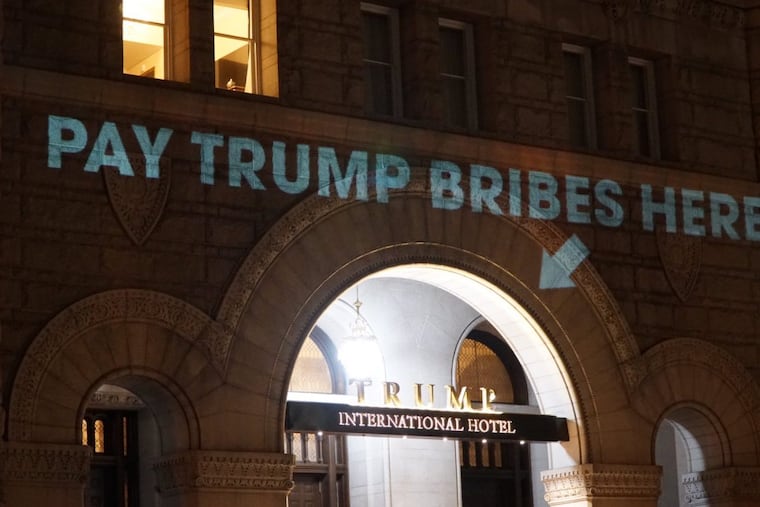D.C., Maryland to sue Trump alleging breach of constitutional oath
The lawsuit alleges that he has violated anti-corruption clauses in the Constitution by accepting millions in payments and benefits from foreign governments since moving into the White House.

Attorneys general for the District of Columbia and the state of Maryland say they will sue President Trump on Monday, alleging that he has violated anti-corruption clauses in the Constitution by accepting millions in payments and benefits from foreign governments since moving into the White House.
The lawsuit, the first of its kind brought by government entities, centers on the fact that Trump chose to retain ownership of his company when he became president. Trump said in January that he was shifting his business assets into a trust managed by his sons to eliminate potential conflicts of interests.
But D.C. Attorney General Karl Racine, D, and Maryland Attorney General Brian Frosh, D, say Trump has broken many promises to keep separate his public duties and private business interests. For one, his son Eric Trump has said the president would continue to receive regular updates about his company's financial health.
The lawsuit, which Racine and Frosh described to the Washington Post on Sunday night, could open a new front for Trump as he navigates dueling investigations by special counsel Robert Mueller and congressional committees of possible collusion between his associates and the Russian government during the 2016 presidential campaign.
If a federal judge allows the case to proceed, Racine and Frosh say, one of the first steps would be to demand through the discovery process copies of Trump's personal tax returns to gauge the extent of his foreign business dealings. That fight would most likely end up before the Supreme Court, the two said, with Trump's attorneys having to defend why the returns should remain private.
"This case is, at its core, about the right of Marylanders, residents of the District of Columbia and all Americans to have honest government," Frosh said, referring to part of the Constitution known as the emoluments clause, which prohibits U.S. officials from taking gifts or other benefits from foreign governments. "The emoluments clauses command that . . . the president put the country first and not his own personal interest first."
Racine said he felt obligated to sue Trump in part because the Republican-controlled Congress has not taken the president's apparent conflicts seriously.
"We're getting in here to be the check and balance that it appears Congress is unwilling to be," he said. "We're bringing suit because the president has not taken adequate steps to separate himself from his business interests."
The lawsuit, to be filed in U.S. District Court for the District of Maryland, will be the second major legal action related to emoluments. The first was filed in January by Citizens for Responsibility and Ethics in Washington, a D.C.-based watchdog group. Last week, a group of Democratic members of Congress said they also planned to file suit soon. Each, however, faces legal hurdles over standing to sue the president.
In the D.C. area, both the District and Maryland will cite ways they have been adversely affected by the opening of the Trump International Hotel last year near the White House.
The hotel has tilted the playing field in the city's travel and entertainment industry in favor of a venue leased by a Trump company – at least, that is, when it comes to foreign governments that book venues in the nation's capital.
The Embassy of Kuwait held an event at the hotel after initially booking at the Four Seasons. Saudi Arabia, the destination of Trump's first trip abroad, also booked rooms at the hotel through an intermediary on more than one occasion since Trump's inauguration. In April, the ambassador of Georgia stayed at the hotel and tweeted his compliments. Trump himself has appeared at the hotel and greeted guests repeatedly since becoming president.
As a result, the hotel may be drawing business away from both the taxypayer-owned D.C. convention center and one in nearby Maryland subsidized by taxpayers, Frosh and Racine said.
Norman Eisen, who served as White House ethics lawyer for President Barack Obama and is CREW's board chairman, said jurisdictions such as the District and Maryland are among the "most perfect plaintiffs" to sue over emoluments because they have a coequal say in making sure the Constitution is being enforced.
"In the emoluments clauses, we have these ancient air bags that were placed in the Constitution by the framers that are now being deployed," said Eisen, who has been advising the District and Maryland on their suit. "Trump is the framers' worst-case scenario; a president who would seize office and attempt to exploit his position for personal financial gain with every governmental entity imaginable, across the United States or around the world."
The suit will allege that Trump has taken favors from the U.S. government. It will argue that the U.S. General Services Administration wrongly allowed Trump's company to continue to lease the Old Post Office building, where Trump built his D.C. hotel, even though a clause in the contract said no elected official could remain on the lease.
The GSA initially said Trump would have to fully divest from the hotel after the election. But after Trump proposed increasing GSA's budget, the agency issued a letter saying Trump was in full compliance with the lease.
The suit will seek an injunction to force Trump to stop violating the Constitution, but will leave it up to the court to decide how that should be accomplished.
Everything is happening so fast — or at least that's how it feels trying to follow politics these days. You've seen the headlines about President Trump and his policies — but what do they mean for Philadelphia? What does that mean for you? We've launched a newsletter to explore just that. You can sign up to get the weekly Trumpadelphia newsletter in your inbox every Tuesday.